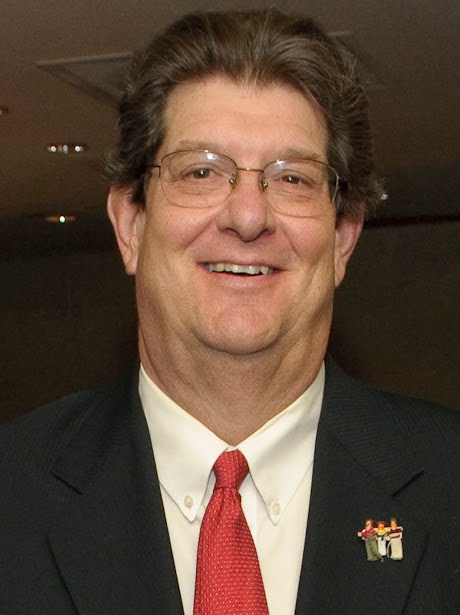Elliott (Elly) Dlin passed a way from a massive heart attack last week. He was 57 years old.
Elly began his career in the field of Holocaust Education and Museums at Yad Vashem in 1978. Along with a changing cast that included Shalmi Barmore, Yehiam Weitz, Itzik Mais, David Silberklang, Yaacov Lozowick, Michael Yaron, Shoshie Rozin, Adina Drechsler and myself, he was the heart of the then Education Department at Yad Vashem throughout the 1980s. In the early 1990s, he became the Director of the Valley of Jewish Communities. After 22 years at Yad Vashem, Elly assumed the position of Director of the Dallas Holocaust Memorial, which he held until his passing.
In the summer of 1978, I entered the Ulpan for Hebrew language study at the Hebrew University of Jerusalem, toward my graduate studies. On the first day of class I became acquainted with a tall, husky and very friendly Canadian – Elly Dlin. We soon learned that we had more than being new immigrants in common. My graduate work was to focus on the History of the Holocaust and Elly already had an MA in Modern European History from the University of British Columbia – Vancouver. In addition to starting his studies toward teacher certification at the Hebrew University, he was slated to begin working part time at Yad Vashem as a lecturer and guide.
After I finished my coursework for my MA and begin working on my thesis in the summer of 1980, Elly helped set up my first real job in the field. Joining him, I began lecturing at Massuah, the Holocaust educational institute at Tel Yitzhak. Having never really lectured before, Elly provided me with important tips about outlining a talk. To this day I follow his invaluable advice about focusing on only a few main points.
By the following summer, Elly was working fulltime at Yad Vashem, and I was putting together my PhD. proposal. He suggested I begin work at Yad Vashem and I soon took to guiding groups and lecturing alongside him there as well. Elly was the person who listened to me the first times I guided and lectured, once again offering constructive criticism. Eventually like him, I was able to give a coherent lecture on a number of topics at a moment’s notice.
One of the most important changes at Yad Vashem to which Elly was a partner, was the initiation of seminars for teachers from abroad. He and Shalmi Barmore set up the first seminar in the early 1980s in English. This was the beginning the many international contacts Elly maintained while at Yad Vashem. The seed he helped sow, yielded much fruit. During the last calendar year (2009), Yad Vashem ran 90 such seminars in a multitude of languages. As a senior member of the Education Department, Elly worked on curriculum development and educational units. One of the most successful was his unit on Kristallnacht.
In the early 1980s we frequently had conversations that in retrospect I think were ahead of the curve. I remember us discussing the idea that one cannot construct Jewish identity solely around the Holocaust and talking about how problematic the idea is of deriving a specific set of lessons from that painful history. Pursuant to the latter, Elly used to lecture on how one could learn such a variety of things from human behavior in the Holocaust, much of it contradictory, that one must be very careful about drawing simplistic lessons. No matter which job Elly fulfilled throughout his career, at his core he was an educator.
Around the time Avner Shalev became Chairman of the Yad Vashem Directorate (1993), Elly was made the Director of the then, new, Valley of Jewish Communities. It is in this job that Elly began to shine as a curator of museum exhibits. He brought a number of exhibits to the Valley, including one on Lubomil and another on diplomats who rescued Jews during the Holocaust.
Elly was not only creative, he had an amazing memory and breadth of knowledge. I recall discussing some subject with him on a bus ride, when he not only quoted a passage he had read, but cited the footnote as well. Although he began but never completed his PhD. dissertation, Elly knew as much if not more about the history of the Holocaust than most University professors. He was a voracious reader, redolent with curiosity, and never seemed to be able to learn enough.
For many new immigrants to Israel, friends often take the place of distant family. For me, Elly was like family. I remember his bubbling enthusiasm when he first introduced me to his future wife, Carol. At his wedding, I clearly remember hoisting Elly into a chair, along with David Silberklang and few other close friends, and dancing with him. It must be borne in mind that it was no mean feat, since Elly was never a 90 lb weakling. Over the years we participated in each other’s family events, Brit Milah ceremonies, parties for the births of our children, Independence Day picnics and more. And then there were the dogs. Elly always had at least one dog and they were invariably as friendly, warm and gentle as their owner. Although one may well make friends with co-workers over time, it is a rare treat to begin work with someone who is already a friend, and to maintain that friendship while working together despite the ins and outs of office politics.
Sadly, over the last few years after Elly moved to Texas, our contact lessened. Life sometimes overtakes the best of intentions. But I know that for me, and for many others at Yad Vashem, Elly’s passing came as a great shock. As a colleague, mentor and friend, we continue to hold his memory dear.





